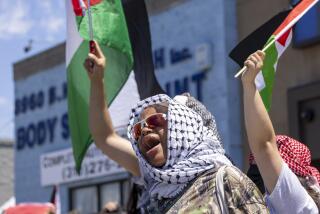Secrecy of S.D. Peace Talk Plans Upset by Israel
- Share via
A refusal by Israel to grant travel permits to two Palestinians has blown the secrecy of a symposium scheduled later this month in San Diego to discuss Middle East issues.
News of the symposium had been restricted to a few Arab-American leaders and to those who had been invited.
San Diego businessman Fozi Khouri, active in the local Arab-American community, said that the weeklong meeting will begin next Tuesday, but he declined to reveal the location. Khouri said the meeting will include “Arabs, Jews and Americans” who will discuss possible solutions to the dispute between the Palestinians and Israelis over a Palestinian homeland.
A source familiar with the symposium said that “some Israeli Jews” will attend. Khouri said that the meeting is sponsored by an independent U.S. foundation based in California, but refused to identify it.
“This meeting was supposed to be low-key, with no publicity. The foundation that is sponsoring it also did not want any publicity. . . . Not even our own (Arab) community knows about it,” said Khouri, who would not reveal any more information about the meeting.
Israeli officials in Tel Aviv announced Saturday that they would not issue travel permits to deposed Hebron Mayor Mustafa Natshe and Gaza lawyer Faez Abu-Rahme to attend the conference. According to a Defense Ministry spokesman in Tel Aviv, Israeli officials feared that both men would meet with “hostile elements” while in San Diego. They did not elaborate.
However, travel permits were given to three other Palestinian leaders, including Al Fajr newspaper editor Hanna Siniora.
News of the symposium caught a number of Arab community leaders in California by surprise. Several influential leaders who were questioned about the symposium, including News Circle editor Joseph Haiek, said they were not invited or informed about the meeting. Haiek’s newspaper, which is published in Glendale, is aimed at the state’s Arab-American community.
Arab community leaders who did not wish to be identified and who were not invited to the meeting theorized that the organizers might have insisted on secrecy for security reasons. These sources said that the 1986 murder of Alex Odeh in Orange County and other incidents of violence directed toward Arab-American organizations in the United States might have prompted the secrecy. Odeh, head of the Arab-American Anti-Discrimination League, died in a bombing of his Santa Ana office.
Khouri admitted fear of violence played a part in the organizers’ decision to hold the symposium outside the glare of publicity.
“We didn’t want radicals from both sides to sabotage the symposium,” Khouri said. “All we’re interested in is starting a dialogue that hopefully will lead to a peaceful solution for the problems of the Middle East. How much more can we take of the senseless killing and violence that is so common there? There has to be an answer.”
More to Read
Sign up for Essential California
The most important California stories and recommendations in your inbox every morning.
You may occasionally receive promotional content from the Los Angeles Times.













![Vista, California-Apri 2, 2025-Hours after undergoing dental surgery a 9-year-old girl was found unresponsive in her home, officials are investigating what caused her death. On March 18, Silvanna Moreno was placed under anesthesia for a dental surgery at Dreamtime Dentistry, a dental facility that "strive[s] to be the premier office for sedation dentistry in Vitsa, CA. (Google Maps)](https://ca-times.brightspotcdn.com/dims4/default/07a58b2/2147483647/strip/true/crop/2016x1344+29+0/resize/840x560!/quality/75/?url=https%3A%2F%2Fcalifornia-times-brightspot.s3.amazonaws.com%2F78%2Ffd%2F9bbf9b62489fa209f9c67df2e472%2Fla-me-dreamtime-dentist-01.jpg)